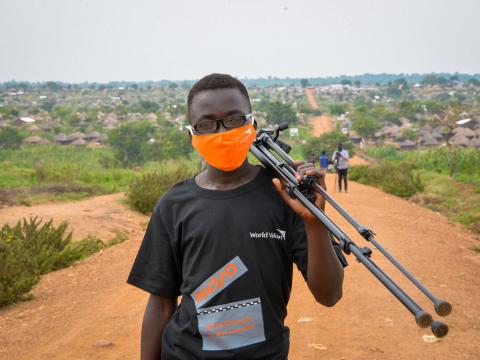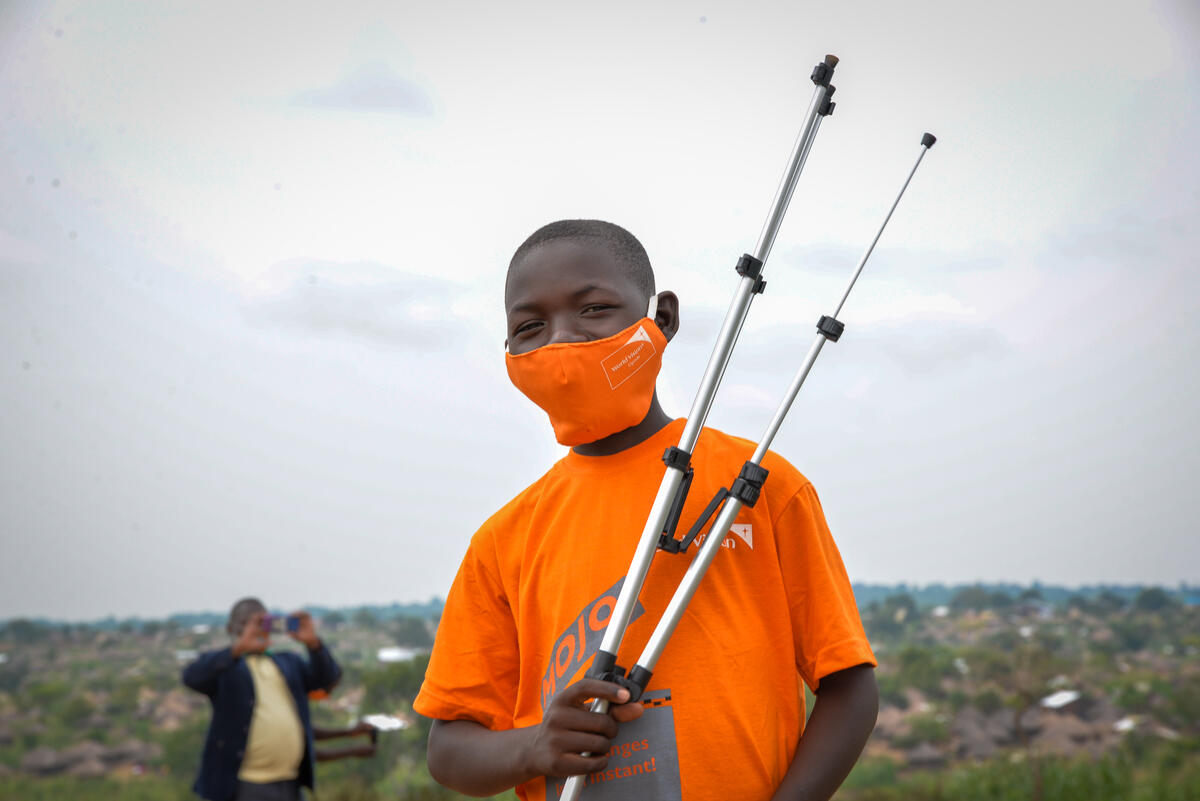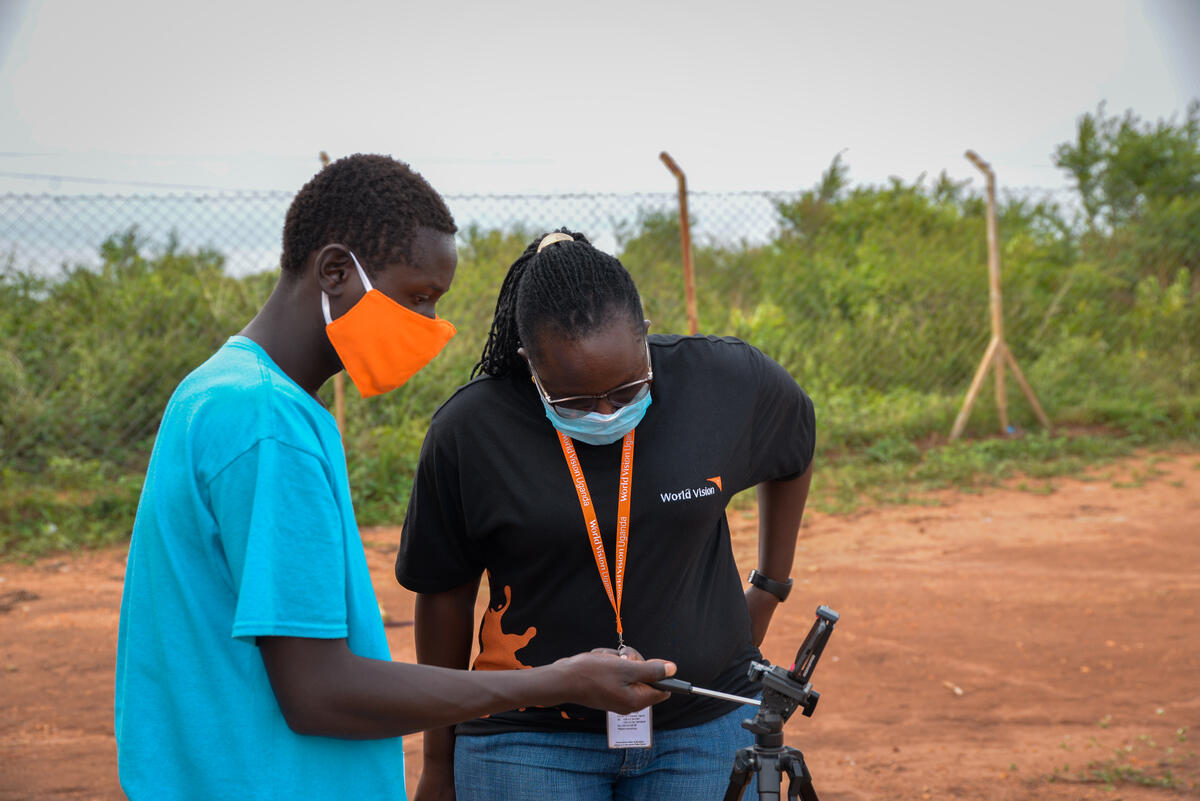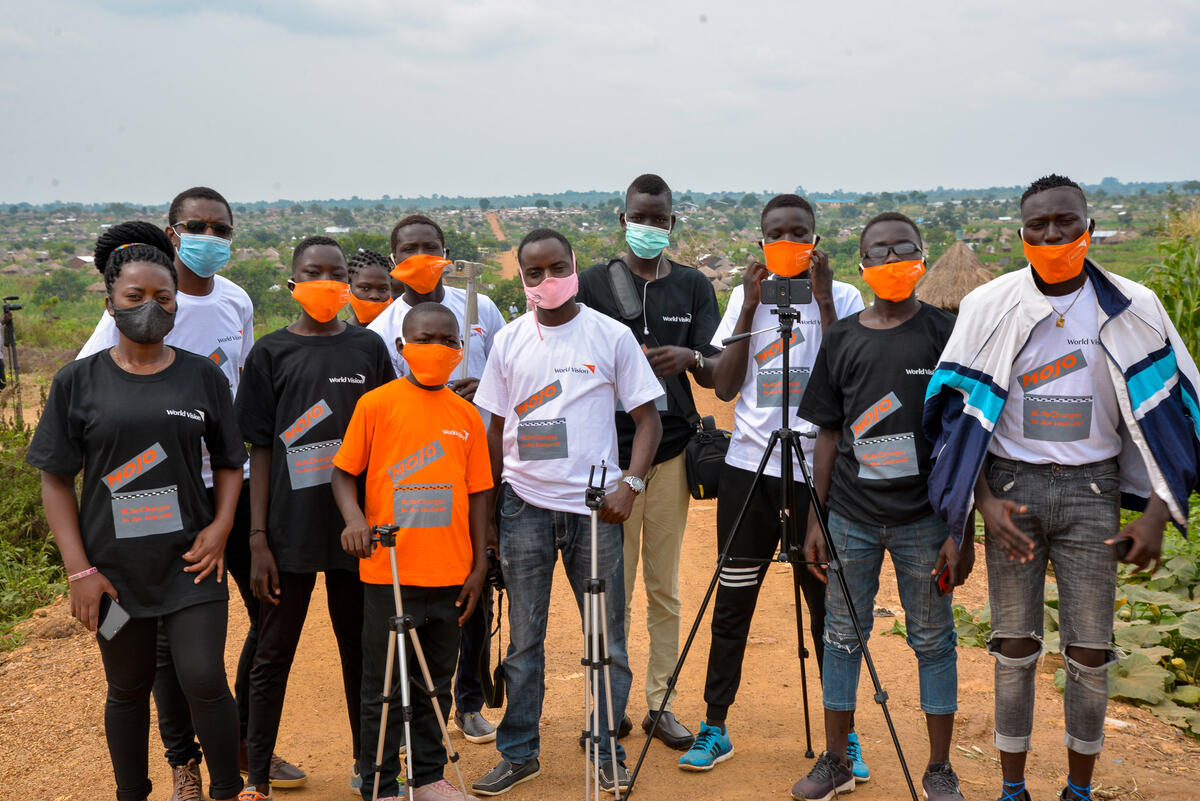World Vision empowers refugee children with mobile journalism skills

By Derrick Kyatuka, Communications Officer, Uganda Refugee Response
“I had to walk from village eight up to here, I did not want to miss this exciting exercise. Last year it was fun and we learnt a lot!” says 14-year-old Job, after walking about five kilometers to attend a Mobile Journalism training (MOJO).
Job is a young, energetic boy, who fled from South Sudan with his father. He stays in Zone 3, Bidibidi refugee settlement. He is now a mobile journalist trained by World Vision to tell stories about his community using a mobile phone.
“I can now talk on camera, speak better English and my confidence has also increased. When I heard that there is another training to create stories for World Refugee Day, I rushed to come and join,” adds Job with a big smile.
Job worked with eight other 'MoJos' (mobile journalists) to gather stories and produced them for a newscast that was streamed live on Facebook on World Refugee Day 2020 (June 20). The stakes were high, the deadlines and targets crazy, but the Bidibidi MoJos were up to the task.
In the field
Holding a tripod stand in one hand and a notebook in the other, Job enters the homestead of Mary Apayi, a breadwinner for 14 children in Bidibidi refugee settlement. Speaking in a South Sudanese local dialect, Kakwa, Job exchanges greetings with Mary and quickly introduces himself and his team. Mary, seated on a wooden stool inside her makeshift kitchen, is preparing lunch for her children.
Job apologises for catching Mary in the middle of her lunch preparation. Their agreement to have the interview a few days ago, had not included a specified time.
Mary seems taken up by the cooking as Job engages her in small talk. When the food is finally ready, Mary quickly slices the posho (maize/corn meal) and serves it to her children with beans.
Job, as requested, waits for the family to finish their meal. Once they do, he sets up the filming equipment, ready for the interview. He has waited for this moment for over half an hour. He throws his eyes around the compound as he searches for a spot fit for an interview. When he is satisfied with a spot in front of the house, Job positions his phone and confidently starts to interview Mary.
He is documenting a story about how the recently announced 30% food ration cut by the World Food Programme has changed the feeding pattern of most refugees who have been entirely dependent on this food relief for survival. His story is to feature in a child-led news bulletin on World Refugee Day.

Children tell their stories best
Previously, stories about children like Job were only told by adults. The MoJos are, however, evidence that children like Job tell their stories best with a little guidance. Their perspective is always fresh and exciting.
With the emergence of new media and Mobile Journalism, everyone including children, can use mobile devices like phones to gather, edit and publish information from their communities. For the past one year, World Vision has equipped refugee children aged between 13 and 18 years in Bidibidi refugee settlement with journalism skills and media ethics to share stories from within their community. The mobile journalism skills have given them a voice.
In May 2019, Yusuf Omar, a multi-award winning journalist and Co-founder of Hashtag Our Stories, with his wife Sumaya Omar, trained refugee children on how to use mobile phones to tell their stories.
When COVID-19 was declared a pandemic, the MoJo champions worked closely with World Vision's field communications team to gather COVID-19 related content. The content was shared on World Vision's Uganda social media channels, and across the World Vision partnership.
David (17) did a story on how refugee teenagers are using music to help stop the spread of COVID-19 in the settlement: “I was not part of the group that was trained last year. A friend of mine who was already part of the group invited me to join. The day I joined I was taken through the basics and I was able to document my very first story which was about COVID-19 awareness campaigns in the settlement,” David says.
He adds: “After watching my first story, I felt motivated to do more. My stories have been shared by both local and international media and many people have watched me. I felt very happy when I got to know that my work had been shared on bigger platforms like television. My family is now proud of me.”

Josephine says reporting stories has helped to boost her self-esteem and kept her busy since she cannot go to school: “The start was not easy because it was my first time to be engaged in such an activity but the whole experience later turned out to be exciting. The interviews I have conducted have helped to boost my confidence unlike before when I was shy,” she says.
“My mother is proud of me and every time I am needed to participate in content gathering she gives me permission because she knows I will be in safe hands. My peers have been asking how they can join our group because our work in the community is inspiring most of them. We are now role models and the skills we are getting will be of great help in future,” Josephine adds.
Albert envisions himself as a professional journalist in future: “I have been equipped with scriptwriting skills and taught video editing on a mobile phone. I have also learnt to shoot different video shots and their importance in news making. I want to study hard and become a journalist.”
Parents say that this is the perfect way to keep the children engaged during the lockdown.
“I like what you people of World Vision are doing with the children,” Pastor Isaac Badaye, a father to one of the MoJos said. “It is very good and it improves their skills, and also helps them to speak good English. This is practical work that they cannot even get at school.”
According to World Vision’s Communications Coordinator in the Uganda Refugee Response, Aggrey Nyondwa, the initiative to equip children with journalistic skills is to develop their language skills, groom talent and provide a platform for their voices to be heard: “The innovative idea of having young mobile journalists in refugee settlements was rolled out to enhance children’s participation, creativity, develop their language and build their confidence and self-esteem. As children grow, they require these skills and to know that their ideas also count, especially at such a time with the COVID-19 pandemic,” says Aggrey.

Refugee Day news bulletin
Due to COVID-19 restrictions like social distancing, there was no public gathering to commemorate World Refugee Day 2020. Most of the engagements worldwide, including in the refugee settlements, were virtual through various digital platforms and mainstream media. The young journalists gathered stories that they shared with the rest of the world through a news bulletin. Within the bulletin, there was a segment in which they engaged the refugee response leaders on how refugees, especially children, can be further supported during this time.
Aggrey says the idea was to commemorate the day in an exciting and engaging way, despite having no social gatherings. The stories also helped paint a picture of how refugees’ lives were changed, first with being displaced from their homes and now having to deal with COVID-19.
“We worked with Ultimate Multimedia Consult, a multimedia journalism and communications organisation to train our MoJos on how to produce a news bulletin. Children took the lead in news gathering, reporting and anchoring. It was an uphill task for them but they pulled it off which shows how committed they are. Our future plan is to train more refugee children in other settlements,” Aggrey says.